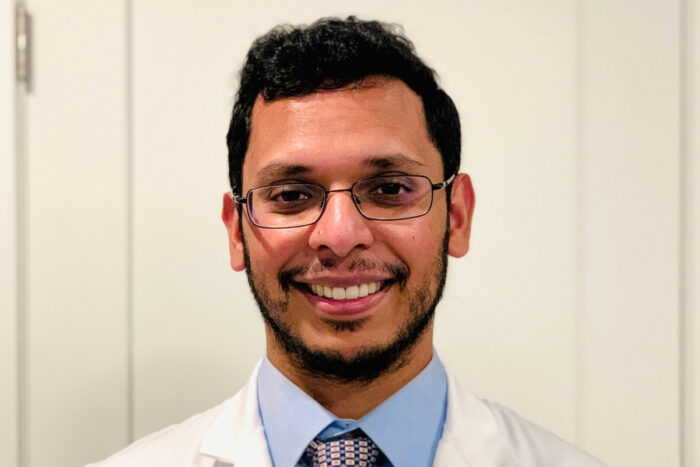Medical student receives fellowship to study skin microbiome, diseases
Alpha Omega Alpha National Honor Medical Society recognizes Ahmad
 Courtesy of Faisal Ahmad
Courtesy of Faisal AhmadFaisal Ahmad, a second-year medical student at Washington University School of Medicine in St. Louis, has received a summer research fellowship from the Alpha Omega Alpha National Honor Medical Society. The Carolyn L. Kuckein Student Research Fellowship Award supports Ahmad’s research on the relationship between the skin microbiome and dermatological conditions such as eczema and acne.
Faisal Ahmad, a second-year medical student at Washington University School of Medicine in St. Louis, is one of 55 recipients of a $5,000 summer research fellowship from the Alpha Omega Alpha National Honor Medical Society.
The Carolyn L. Kuckein Student Research Fellowship Award supports Ahmad’s research on the relationship between the skin microbiome and dermatological conditions such as eczema and acne. Ahmad uses computational and statistical analysis to decipher genetic information about how diseases and therapeutics affect skin bacterial communities. Ultimately, the findings may contribute to developing precision medicine to heal skin diseases.
Ahmad has been working under the mentorship of William H. McCoy IV, MD, PhD, research instructor in medicine in the Division of Dermatology. His research focus is microbial communities on the skin, with the aim of developing nonantibiotic treatments for common conditions such as acne. This is important because infections caused by antibiotic-resistant germs can be hard or impossible to treat.
“Faisal is a phenomenal trainee to have in a research group,” McCoy said. “He elevates the work of everyone around him, including his mentor, to a higher level through his inquisitiveness, consummate professionalism and relentless work ethic. I believe his research will significantly impact the care of patients with skin diseases, ranging from life-threatening Staphylococcus aureus infections to pimples that plague nearly every teenager.”
The fellowship allows Ahmad to spend 10 weeks focusing on his research.
“I am grateful to Dr. McCoy for his remarkable mentorship and exposing me to the leading edge of microbial research,” Ahmad said. “I found it especially rewarding to use principles I learned in the classroom and apply them to work I did in the laboratory. This complements my desire to become a physician-scientist who can contribute to advances in medical research, which will result in my future patients living healthier and more fulfilling lives.”
Only one student per school is allowed to apply to the fellowship each year. Nominations were submitted by 67 medical schools.
“This is an ambitious fellowship because of the intense competition,” said the School of Medicine’s Allyson R. Zazulia, MD, a professor of neurology and of radiology, associate dean for continuing medical education, and councilor for the university’s Alpha Omega Alpha chapter. “We are excited for Faisal.”






